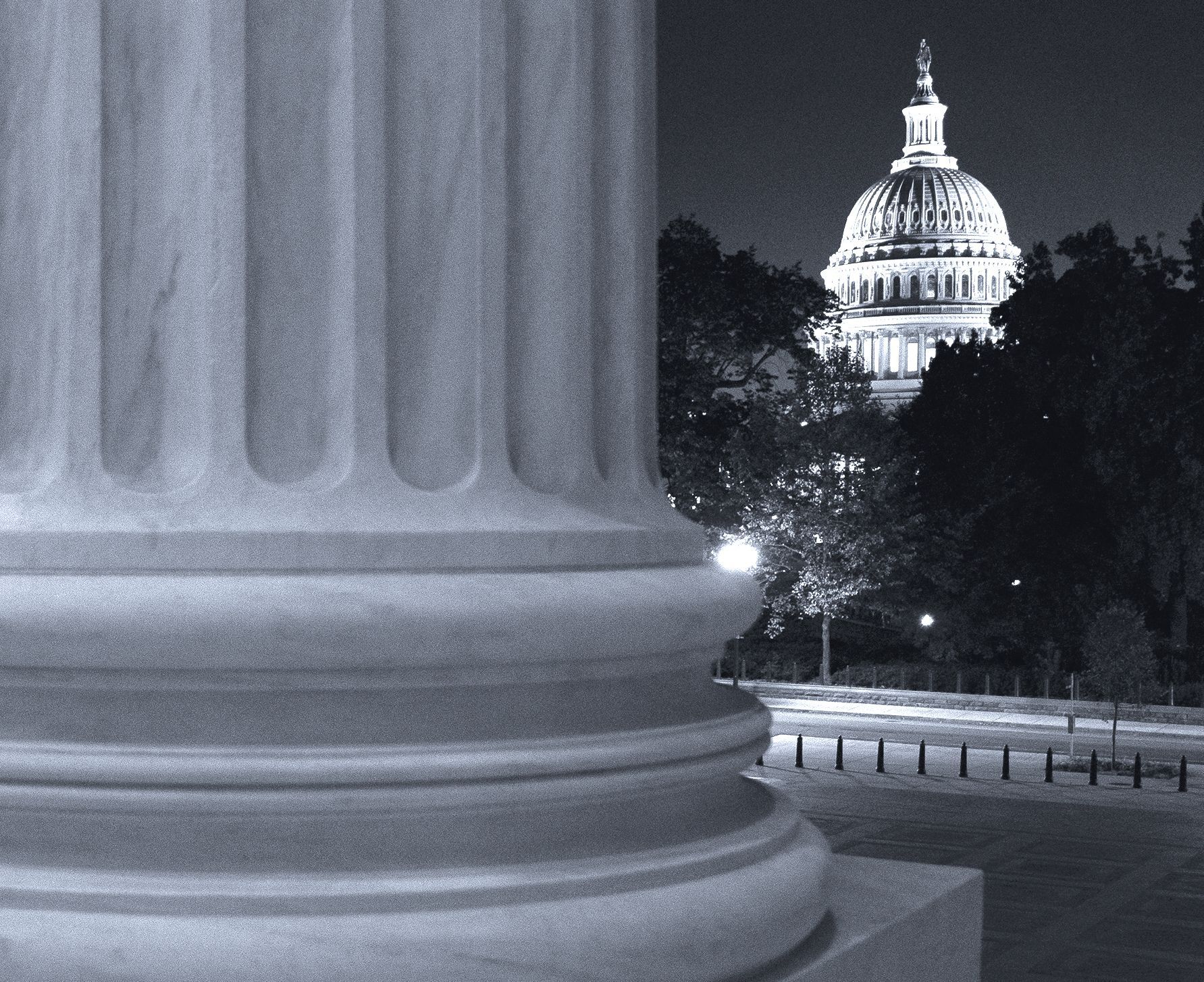
Congress’s year-end omnibus legislation that funds the federal government, which was signed by President Biden on December 29, 2022, included three pieces of legislation—the Merger Filing Fee Modernization Act, the State Antitrust Enforcement Venue Act, and the Foreign Merger Subsidy Disclosure Act—that affect antitrust law and enforcement.
Merger Filing Fee Modernization Act (MFFMA)1
The MFFMA increases Hart-Scott-Rodino (HSR) premerger notification filing fees for larger transactions while decreasing fees for smaller transactions. The bill was originally proposed by, among others, Senators Amy Klobuchar and Chuck Grassley.2
The old and new fee structures are below:
Old Fee Structure3
| Transaction Value | Current Fees |
| $101 million to $202 million | $45,000 |
| $202 million to $1.01 billion | $125,000 |
| $1.01 billion or greater | $280,000 |
New Fee Structure
| Transaction Value | New Fees |
| $92 million to $161.5 million | $30,000 |
| $161.5 million to $500 million | $100,000 |
| $500 million to $1 billion | $250,000 |
| $1 billion to $2 billion | $400,000 |
| $2 billion to $5 billion | $800,000 |
| $5 billion or greater | $2.25 million |
The MFFMA includes a new provision that will adjust the filing fees for inflation annually, limiting the need to continually adjust fees through new legislation. (The current filing fees had not been changed in over a decade.4)
The MFFMA is expected to substantially increase overall filing fees. The Congressional Budget Office estimated that the MFFMA would increase filing fees by $1.4 billion over the 2023-27 period.5 This will result in greater resources for agency enforcement as the substantial bulk of the agencies’ budgets derives from filing fees.6
The MFFMA also contains a separate rider, which was not in the original version of the bill,7 requiring the Department of Justice (DOJ) and the Federal Trade Commission (FTC) to issue an annual report on premerger notification filing fees and the and the FTC to issue a report listing the actions taken with a 3-2 vote among the Commissioners and the proportion of such votes. Recent years have seen numerous prominent 3-2 votes at the FTC, including to issue new compulsory process resolutions,8 to challenge to Meta’s acquisition of Within,9 and to rescind the Vertical Merger Guidelines.10
State Antitrust Enforcement Venue Act (SAEVA)11
The Judicial Panel on Multidistrict Litigation (JPML) is empowered to, with certain exceptions, consolidate cases pending in different districts into a single action before a single court when they concern common questions of fact. Antitrust suits filed by the federal government have been exempt from this process;12 SAEVA would extend this exemption to include antitrust suits filed by state governments. SAEVA will not apply to any actions already filed. The effect is that state attorneys general will have more power to ensure that antitrust cases they bring will be heard in their preferred forums. SAEVA also removes the separate provision that the JPML can consolidate Clayton Act cases brought by state attorneys general.13
SAEVA was prompted in part by Google’s successful move to change the venue of a case brought by Texas and other states,14 which was eventually consolidated with related cases in the Southern District of New York.15 The bill was originally proposed by, among others, Sen. Mike Lee16 and had been publicly supported by the National Association of Attorneys General (NAAG)17 and FTC Chair Lina Khan.18
Foreign Merger Subsidy Disclosure Act (FMSDA)19
The FMSDA requires that entities receiving subsidies from a “foreign entity of concern” (as defined by the Infrastructure Investment and Jobs Act, better known as the bipartisan infrastructure bill) to include information regarding those subsidies in HSR premerger notifications. A “foreign entity of concern” includes, among other things, foreign terrorist organizations, entities on the Specially Designated Nationals list maintained by the Office of Foreign Assets Control, and entities that are determined by the Secretary of Energy “to be engaged in unauthorized conduct that is detrimental to the national security or foreign policy of the United States.”20
The legislation directs the FTC, with the concurrence of the Antitrust Division of the Department of Justice and in consultation with the Secretary of Commerce and other government agencies, to issue a rule regarding the notification requirements, although it does not specify a date by which the rule must be issued.21 The legislation requires only that “be in such form and contain such documentary material and information relevant to a proposed acquisition as is necessary and appropriate to enable the Federal Trade Commission and the Assistant Attorney General in charge of the Antitrust Division of the Department of Justice to determine whether such acquisition may, if consummated, violate the antitrust laws.”22
For more information, please contact Wilson Sonsini partner Brad Tennis or another member of the firm's antitrust and competition practice.
[1] H.R. 2617, 117th Cong., Division GG, Title I (2022).
[2]Press Release, “Klobuchar Bipartisan Legislation to Strengthen Antitrust Enforcement Passes House” (Sept. 29, 2022), https://www.klobuchar.senate.gov/public/index.cfm/2022/9/klobuchar-bipartisan-legislation-to-strengthen-antitrust-enforcement-passes-house.
[3]The current ranges are published on the FTC’s website. See Fed. Trade Comm’n, “Filing Fee Information” (Mar. 3, 2022), available at https://www.ftc.gov/enforcement/premerger-notification-program/filing-fee-information.
[4]87 Fed. Reg. 3541 (Jan. 24, 2022), https://www.govinfo.gov/content/pkg/FR-2022-01-24/pdf/2022-01214.pdf.
[5]Congressional Budget Office, “S. 228, Merger Filing Fee Modernization Act of 2021” (Sept. 28, 2022), https://www.cbo.gov/publication/58537.
[6]See Department of Justice, Appropriation Figures for the Antitrust Division, Fiscal Years 1903-2023* (Oct. 2022), available at https://www.justice.gov/atr/appropriation-figures-antitrust-division.
[7] Merger Filing Fee Modernization Act of 2021, S. 228, 117th Cong. (Feb. 24, 2021) (introduced version of legislation).
[8] Press Release, “Federal Trade Commission Authorizes Three New Compulsory Process Resolutions for Investigations” (Aug. 26, 2022), https://www.ftc.gov/news-events/news/press-releases/2022/08/federal-trade-commission-authorizes-three-new-compulsory-process-resolutions-investigations.
[9] Press Release, “FTC Seeks to Block Virtual Reality Giant Meta’s Acquisition of Popular App Creator Within” (July 27, 2022), https://www.ftc.gov/news-events/news/press-releases/2022/07/ftc-seeks-block-virtual-reality-giant-metas-acquisition-popular-app-creator-within.
[10] Press Release, “Federal Trade Commission Withdraws Vertical Merger Guidelines and Commentary” (Sept. 15, 2021), https://www.ftc.gov/news-events/news/press-releases/2021/09/federal-trade-commission-withdraws-vertical-merger-guidelines-commentary.
[11] H.R. 2617, 117th Cong., Division GG, Title III (2022).
[12] See 28 U.S.C. § 1407(g) (“Nothing in this section shall apply to any action in which the United States is a complainant arising under the antitrust laws.”).
[13] See 15 U.S.C. § 15c (Section 4C of the Clayton Act).
[14] Alison Frankel, “Tussle between Congress and courts lurks in Google's JPML bid,” Reuters (July 28, 2021), https://www.reuters.com/legal/litigation/tussle-between-congress-courts-lurks-googles-jpml-bid-2021-07-28/.
[15] Bryan Koenig, “State AGs' Google Ad Suit Must Join Private Ones In NY,” Law360 (Aug. 10, 2021), https://www.law360.com/articles/1411575/state-ags-google-ad-suit-must-join-private-ones-in-ny.
[16]Press Release, “Lee’s Antitrust Venue Act Passes Senate” (June 16, 2022), https://www.lee.senate.gov/2022/6/lee-s-antitrust-venue-act-passes-senate.
[17]Press Release, “Attorneys General to Congress: Provide States with the Same Antitrust Venue Rights as Federal Enforcers” (June 18, 2021), https://www.naag.org/press-releases/attorneys-general-to-congress-provide-states-with-the-same-antitrust-venue-rights-as-federal-enforcers/.
[18]Letter from Lina Khan to Durbin et al. (Feb. 7, 2022), https://www.ftc.gov/system/files/ftc_gov/pdf/khanlettersenatestateantitrustenforcementvenueact.pdf.
[19] H.R. 2617, 117th Cong., Division GG, Title II (2022).
[21] H.R. 2617, 117th Cong., Division GG, Title II § 202(c) (2022).
Contributors
- Privacy Policy
- Terms of Use
- Accessibility
